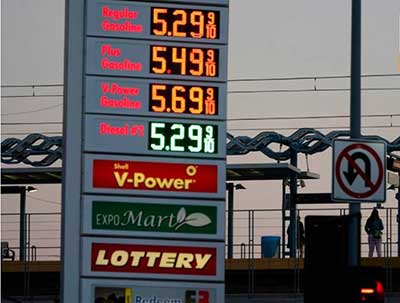Relevance: GS-3: Indian Economy and issues relating to Planning, Mobilisation of Resources, Growth, Development and Employment
Key Phrases: To hit the main artery of Russia’s economy, US is the world’s largest producer and a net exporter of crude oil, European countries are reliant on Russia for natural gas imports, India imports more than 84% of its total oil demand.
Why in News?
- The United States on Tuesday banned all imports of Russian oil and gas and energy in an effort to hit the main artery of Russia’s economy
- The UK has also announced plans to phase out imports of Russian crude oil by the end of 2022.
What does the ban entail?
- The ban blocks any new purchases of Russian crude oil, certain petroleum products, liquefied natural gas, and coal, and winds down the deliveries of existing purchases that have already been contracted for.
- New investments from the US in Russia’s energy sector are also prohibited under the ban.
- The ban does not, however, impact the ability of other countries to
import Russian crude oil or natural gas.
- US clarified that other allies of US aren’t compelled to undertake similar measures
- The US is able to take this step because of its strong domestic energy production and infrastructure.
The status of Oil Industry
- The US is the world’s largest producer and a net exporter of crude oil.
- In 2021, Russian crude oil accounted for about 10% of US oil imports but about 30% of the oil imports of Europe.
- Russian Crude oil is easily refinable without requirement of sophisticated distillery changes required in case of Venezeulean Oil.
- Russian Crude is easily extractable thereby reducing the operating coast of the whole process thereby translating to a cheaper price tag.
- Russia is the 2nd largest producer of oil and 2nd largest exporter of oil.
- European countries are reliant on Russia for natural gas imports.
- In 2021, the EU imported 155 billion cubic metres of natural gas from Russia, accounting for about 45% of EU gas imports and nearly 40% of the EU’s total gas consumption.
How will the ban affect crude oil prices?
- Experts noted that as long as Russian crude oil supplies continue, there would not be a major impact on crude oil prices which are already near 14 year highs.
- Brent crude was trading at $130.8 per barrel on Wednesday up 34% since Putin announced military operations in Ukraine.
- Oil is a very sensitive and finely balanced global commodity. Any supply side disruption has a disproportionate impact on prices.
- As long as Russian crude supplies are continuing, this is more of a symbolic step coming from the US
- Economic sanctions imposed by the US and Europe have already had
some impact on exports of Russian crude oil.
- Analysts have noted that cargoes of Russian crude oil are struggling to find buyers with many concerned about the reputational damage from buying Russian crude which is now being offered at steep discounts due to sanctions.
How are rising crude oil prices going to affect Indian consumers?
- The sharp uptick in crude oil prices comes as Indian consumers have been enjoying a four month reprieve from rising fuel prices with oil marketing companies (OMCs) having kept the price of petrol and diesel constant since early November.
- With elections in Uttar Pradesh, Punjab, Uttarakhand, Manipur, and Goa having come to a close, consumers are expected to see a consistent increase in fuel prices starting this week as OMCs look to bring prices in line with international benchmarks and recoup losses.
- Price of petrol and diesel have to be hiked by about 52 paise for
every dollar increase in the price of crude oil for OMC marketing margins to
remain constant.
- The price of crude oil has risen by about $50 per barrel since the price of petrol and diesel was last revised in November.
- Petrol is currently retailing at Rs 95.41 per litre in the national capital while diesel is retailing at Rs 86.67 per litre.
India’s experience of surge in oil prices
- India imports more than 84% of its domestic oil requirements.
- A $10/barrel increase in oil price will raise the inflation by roughly 49 bps or increase the fiscal deficit by 43 bps as a % of GDP if the government absorbs the entire oil price shock.
- A 2019- RBI study claims that every $10/barrel increase in crude prices on an annual basis leads to an additional $12.5-billion deficit.
- A 10% increase in crude oil prices causes an increase of :
- 0.9% in Wholesale inflation.
- 0.5% in Retail inflation.
Source: Indian Express
Mains Question:
Q. How will the decision of the US to ban import of Russian Oil will impact India and the world? Explain.









